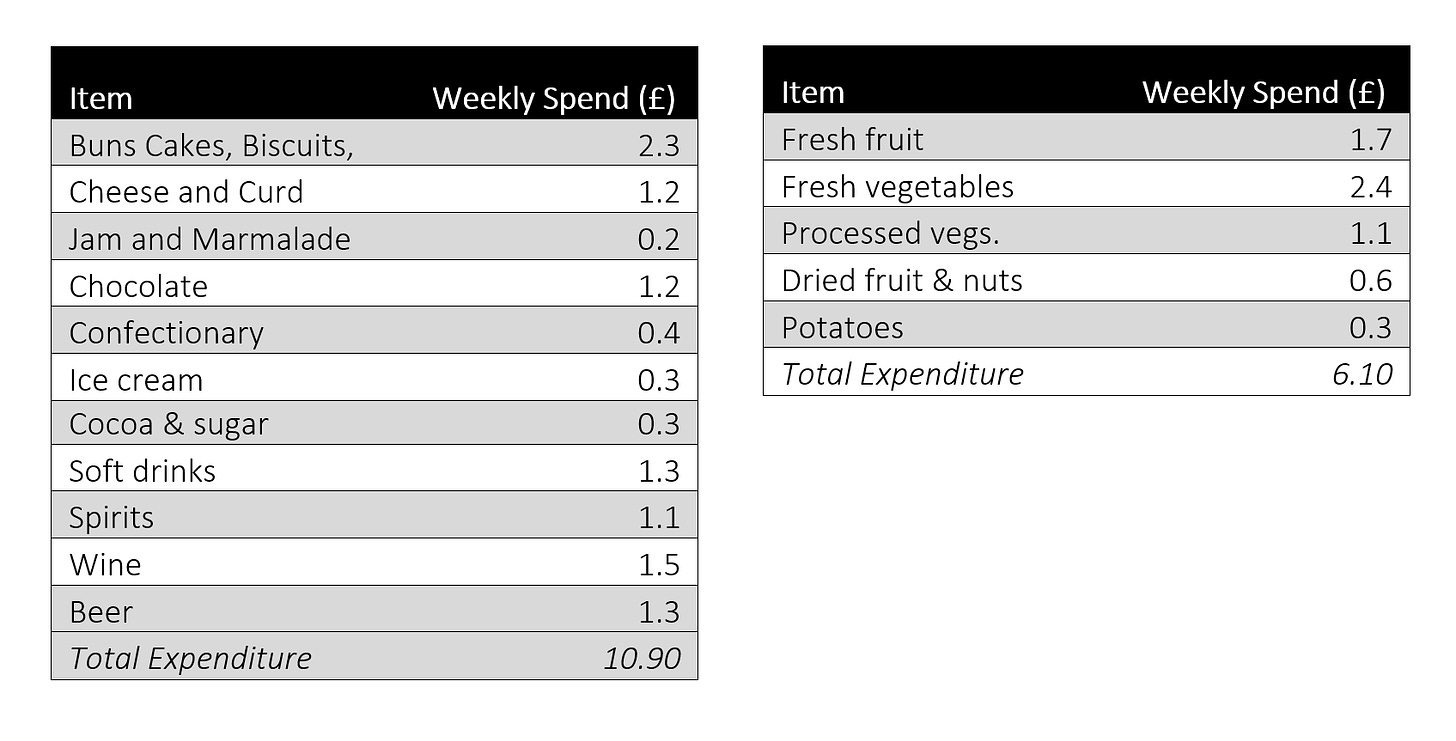Many people in public life today believe poor people are obese or overweight beyond the average because they cannot afford a healthy diet. Take these column headings from The Guardian as evidence: ‘Poverty causes obesity: Low-income families need to be better off to eat well’, ‘The primary cause of Britain’s childhood obesity epidemic is clear: poverty’ and ‘Poverty, not gluttony, is the cause of obesity’. Wealth redistribution, subsidising fruit and vegetables and free school meals are then proposed to sort the problem out. Certainly, I’ve heard the ‘poverty causes obesity’ explanation put in everyday conversations. Is it right though?
No. Only view the fact that the bottom ten percent of households by their expenditure spend 27% of their food and drink budget on unhealthy food, or, £10.90 out of £41.60. This is outlined in the first table.
All the obese poor who want to lose weight need do is not purchase these items and eat less other stuff too. Hardly a financial difficulty for those in poverty. The second table outlines those healthy foods which doctors, politicians and mothers are always encouraging us to eat. Its expenditure adds up to £6.10 a week, or, 15% of their food and drink budget. Simple maths shows that by reducing their expenditure on unhealthy foods and drinks by less than half they could use the saved money to double their spending on fruit and vegetables. Or: The poorest could increase their expenditure on fresh fruit by 100% simply by not buying chocolate, sweets and ice cream. Or: They could increase their consumption of fresh vegetables by over 50% by not buying soft drinks.
I suspect Guardian columnists will still claim these measly budgets hardly allow for healthy eating because the absolute level of spending remains too low. This is false. I could outline where else in their household budget spending could be cut, but healthy eating is entirely possible within their existing food and drink budget. Let’s assume a family of four requires five portions of fruit or vegetables every day, so, 400g each day every day. I am going to use Sainsbury’s prices to show this is entirely possible; not even the cheapest supermarket there is.
In total 11.20 kgs of fruit and vegetables are needed (((80g x 5 portions) x 4 people) x 7 days) which must come from five sources of fruit or vegetables. I suggest you could go with the below mix which adds up to 12.13kgs which costs £11.63. So, for just over an hour’s work on minimum wage a man can feed his whole family the fruit and vegetables they need for a whole week.
Frozen Peas £0.93 for 850g x 2 £1.86 for 1.7kg
Carrots 60p for 1000g x 4 £2.40 for 4kg
Red Onions 95p for 1000g x 1 95p for 1kg
Frozen Broccoli £1.07 for 910g £3.21 for 2.73 kg
Frozen Green Beans £1.07 for 900g £3.21 for 2.7 kgs
Should our working man not want to cut into any other area of his expenditure bar food and drink he could reduce his consumption of unhealthy food and drink by 80% to finance this 12.13kgs. The ONS figures from which I have drawn though show the bottom ten percent of households have an average of 1.3 people within them, meaning, the expenditure on fruit and vegetables really recommended by the government for that number is about £3.88. This comes out at less than the £5.20 the poorest households spend on fruit and vegetables currently. Why am I writing all this?
Well, it's claims such as this, by Camilla Kingston, that just irk me beyond belief: ‘At the end of the day, it is cheaper to put chicken nuggets and chips on a plate than to buy fruit and vegetables’. It’s just utter bollocks. The cheapest chicken nuggets at Sainsbury’s cost £3.13 a kg and chips £1.33 a kg. Any of the vegetables above are cheaper, and, per kg, swede and sprouts are too. And this is taking the chips as the baseline. Although I think eating chicken in the vast majority of cases is immoral (Don’t eat chicken), you can still get a whole chicken at a cheaper price per kilo than its processed friend. What Kingston fails to mention is chicken nuggets and chips is far easier to make than a wholesome roast dinner. Why? Well, that would sound far too much like accusing poor people of laziness, wouldn’t it.
The obesity of the poor is not due to their poverty, rather, their obesity is due to their own free choices. This should be obvious. Why though do intelligent people believe the drivel that Guardian columnists produce. I think it is because it is unpopular to blame individuals for their obesity while it is much more comfortable to blame poverty, advertising, food deserts and ultra processed foods instead. And, who wants to be at a dinner party, cite what I have said about poor people’s spending, then be accused of not living in “the real world”, or, of being naivete, which always seems to be taken seriously when you say things are better than most people think. Plus, all these things give another justification for Leftists to regulate capitalism and redistribute wealth.
I take no issue per se with poor people, or, anyone, being overweight and obese, indeed, I once wrote an article called ‘The government should stop treating obesity as a problem: It isn’t’. I put blame in the title for two reasons, one, those who sincerely do want to lose weight are to blame for their own failings, and, two, it’s attention grabbing. If people eat lots of food and don’t exercise, I don’t think they are necessarily doing anything bad in pursuing those things. What I hate is people coming up with obviously rubbish explanations in public policy discussions simply because it is politically convenient and socially desirable to do so. Whether you are poor or rich, your weight is down to your own choices.





That photo makes me feel almost physically ill. Encountering this sort of thing almost daily is one of the torments of modern life! I largely agree with your arguments - there is absolutely no reason why 'poor' people need to be obese; it's simply a reflection of (a) their incredible ignorance about food and proper cooking, (b) a popular 'culture' based on lowest common denominator consumerism and an assumed right to instant self-gratification and (c) the attitude that 'someone else' (the state) will take responsibility for their own stupid actions. The only thing I would say in their defence is that, at least since New Labour, there has been an 'anti-elitist' tendency in the ruling establishment which has actively encouraged a 'race to the bottom'. The one thing I strongly disagree with, though, is your denial that widespread obesity is a problem. Obviously it puts an enormous strain on the health service (for example, a few years ago it was announced that larger and much more expensive ambulances were required because of the grotesque weight of so many people they needed to transport - this will clearly affect many other aspects of the NHS. It could be solved by charging over-weight people at the point of service, but obviously this won't happen as it would be 'against their human rights' or something.) Also, though, in my opinion it is a problem because it is frankly disgusting and upsetting to that part of the population that retains some degree of self-respect, and undoubtedly affects our mental well-being - I would say in the same way that air pollution, noise pollution, etc. does. I don't enjoy being confronted by self-inflicted wrecks of humanity all the time, any more than I do by rowdy drunks, aggressive beggars, deafening motorbiles, and so on. I totally agree with the principle of individual liberty, but with it should come individual responsibilty, and irresponsible behaviour should have consequences.
As long as people are being bombarded with advertisements showing bad food choices as desirable, it's going to be hard to persuade them otherwise.
Lack of inclusion in most school curriculae of any practical instruction in choosing, preserving or cooking of natural ingredients is a pity.
Finding fruit and vegetables which are not potential carriers of toxic chemicals is becoming harder and organic products tend to be very pricey.
The proliferation of fast food and grocery deliveries direct to homes also makes for potential obesity.
When poor families had allotments, more children grew up on decent diets. The advent of frozen ready meals may have had an adverse effect on diet in at least two ways: Pre-cooked food which is then reheated may lose so much of its nutrient value that eating the packaging could provide a better outcome...
Prices are rising fast and choices appear to be shrinking.
Obesity means that the pump designed for a slim body, the heart, is obliged to work every faster and harder.